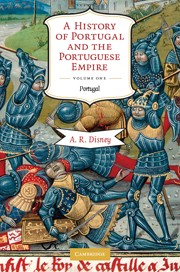Book contents
- Frontmatter
- Contents
- Abbreviations
- List of Maps
- Preface
- Maps
- Introduction: The Geographical Setting
- 1 Hunter-Gatherers to Iron Age Farmers
- 2 The Roman Experience
- 3 The Germanic Kingdoms
- 4 Gharb al-Andalus
- 5 The Medieval Kingdom
- 6 The Fourteenth Century
- 7 The Making of Avis Portugal
- 8 The Golden Age
- 9 The Tarnished Age
- 10 Habsburg Portugal
- 11 Restoration and Reconstruction
- 12 The Age of Gold and Baroque Splendour
- 13 The Age of Pombal
- 14 The Late Eighteenth Century: Finale of the Old Regime
- Glossary
- Bibliography
- Index
12 - The Age of Gold and Baroque Splendour
Published online by Cambridge University Press: 05 June 2012
- Frontmatter
- Contents
- Abbreviations
- List of Maps
- Preface
- Maps
- Introduction: The Geographical Setting
- 1 Hunter-Gatherers to Iron Age Farmers
- 2 The Roman Experience
- 3 The Germanic Kingdoms
- 4 Gharb al-Andalus
- 5 The Medieval Kingdom
- 6 The Fourteenth Century
- 7 The Making of Avis Portugal
- 8 The Golden Age
- 9 The Tarnished Age
- 10 Habsburg Portugal
- 11 Restoration and Reconstruction
- 12 The Age of Gold and Baroque Splendour
- 13 The Age of Pombal
- 14 The Late Eighteenth Century: Finale of the Old Regime
- Glossary
- Bibliography
- Index
Summary
SETTING THE SCENE
The first half of the eighteenth century was a relatively settled and comfortable period for Old Regime Portugal. There was peace and political stability, royal government was more firmly entrenched than ever before and the same advisers and ministers remained in place for many years. Portugal's economic fortunes had improved substantially and Portuguese society appeared tranquil. In artistic expression, this was the time of the Baroque – an era of ostentatious façades, gorgeous gilt interiors, lavish ceremonial, theatrical music and sonorous writings in prose and verse. Many of the kingdom's small elite enjoyed a certain affluence, while Portuguese in general felt more secure and confident than they had for generations.
Nevertheless, there were some aspects of Portuguese life in the early eighteenth century that were not so positive. In contemporary Western Europe, this was the era of the Enlightenment; but Portugal, notwithstanding its quite vigorous revival, was influenced late, selectively and only rather marginally by Enlightenment currents. Certainly there were some Portuguese – and their numbers were growing – who were genuinely enthused by new ideas and ways of thinking. Often they were individuals who had visited foreign countries or at least had secured access to intellectual currents from outside the kingdom – and were therefore referred to, with a touch of suspicion, as ‘foreignised’ (estrangeirados). However, the estrangeirados were a small minority, and, within mainstream Portugal, traditional values and patterns of thought strongly predominated at all social levels.
- Type
- Chapter
- Information
- A History of Portugal and the Portuguese EmpireFrom Beginnings to 1807, pp. 249 - 279Publisher: Cambridge University PressPrint publication year: 2009



